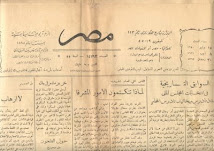Wael speaks to Global Voices Online about the current situation of the Baha'is in Egypt and the changes that the current elections might bring.

Global Voices Online has spoken to Wael, who blogs at Living in Egypt without ID, about the current situation of the Baha’is in Egypt and the changes that the current elections (stage two of which starts on December 14) might bring.
Global Voices (GV): What is the current situation for the Baha’is in Egypt? What are the main problems the community faces?
Wael: As you know, identification documents, especially identity cards and birth certificates, are mandatory for all Egyptians and necessary to obtain access to education, employment, family life, registration and immunization of children, as well as most basic daily activities such as opening a bank account, obtaining a driver’s license, receiving pension or inheritance, or engaging in business transactions.
Most of the Egyptian Baha’is do not have official IDs to allow them to attain any of the above. In addition, they have been barred from holding government jobs, and that situation has not changed as yet. Baha’i marriages are still not recognized in Egypt, and that results in difficulties in obtaining birth certificates for Baha’i children.
While the Supreme Administrative Court ruled that Baha’is should be able to obtain official Egyptian identification cards, the implementation of this ruling has moved very slowly. A few Baha’is were successful in obtaining their IDs with a dash “—“ in the space designated for religion instead of adding the word Baha’i. However, the majority of Baha’is, including myself, have not been successful in obtaining official IDs. The major issue is providing required evidence that their parents were listed as Baha’is or have dashes in the space designated for religion in their IDs, same thing for their birth certificates. On the other hand, married couples can’t obtain official IDs since the Egyptian government does not recognize Baha’i marriage. Therefore so many Baha’is find themselves in a Catch-22 situation. Married or divorced Baha’is are unable to obtain their IDs. The Baha’is in Egypt are determined to obtain their citizenship rights and overcome the bureaucratic hurdles in implementing the Supreme Administrative Court’s decision.
Baha’i centers, properties, libraries, land for a House of Worship, and cemeteries that were confiscated by the Egyptian government in 1960 have not been returned to the Baha’is in Egypt. Baha’is are still banned from forming spiritual assemblies in Egypt. Naturally, the Baha’is in Egypt will continue to practice their religion inside their own homes.
GV: What do you think the result of the current elections will be? Do you feel there will be any changes for the Baha’i community?
Wael: Baha’is are quite optimistic about the future of their country in the long-term. However, Egypt is currently facing problems of corruption and divisions that have been perpetuated and exacerbated by the “divide and rule” mentality. Baha’is call their fellow citizens to unite in their pursuit of freedom, democracy, and development. All Egyptians need to live in dignity. They need a decent education for their children and youth; all expect to be treated equal regardless of their religion or beliefs. Egyptians uphold the rights of women to participate fully in all aspects of human endeavor. Finally, Egyptians have the responsibility to make these goals happen.
Baha’is believe that all people should be treated with respect, dignity and equality, regardless of their social and economic status and of their gender or religion. They will continue to demand their human and civil rights. Baha’is will contribute their part of promoting unity, dignity, and freedom. To quote Baha’u’llah, the prophet founder of the Baha’i faith, “So Powerful is the light of unity that it can illuminate the whole earth.” Egyptians are in a unique position to determine their country’s own unique model of democracy and not blindly follow existing models founded on consumerism and rampant greed. Such a system can reflect the ideals of our youth: good moral character, respect, responsibility, and humility to uphold this generation’s ideals of justice, fairness, freedom, and compassion for all. Egyptian society possesses the potential to evolve a new unique system that is based on personal responsibility, compassion, and serving the common good, and not on greed, fear, and division.
GV: Baha’i teachings prohibit Baha’is from getting involved in partisan politics; does this mean they can't vote in the elections?
Wael: While Baha’is refrain from getting involved in partisan politics, they nonetheless participate in the political process by casting their votes for candidates who in their opinion combine the qualities of unquestioned loyalty, of selfless devotion, of a well-trained mind, of recognized ability and mature experience. Baha’is prefer to focus on the politics of unity rather than division. They do not vote in blocs nor do they endorse a specific candidate or party. Baha’is who are in possession of their IDs can participate in the elections. However, most Baha’is are unable to vote in the elections, as they do not have the official IDs.
GV: Are there other ways Baha’is can get involved in movements for progress in society?
Wael: Baha’is are involved through their jobs, schools, universities, homes, and neighborhoods of promoting unity, as they believe in the oneness of God, the oneness of His Religion, and the oneness of humanity. In their work and day-to-day living, they are committed to serve their neighborhoods and society, as in the Baha’i teachings work performed with the intent to serve humanity is equated with worship.












1 comment:
Great piece!
Post a Comment